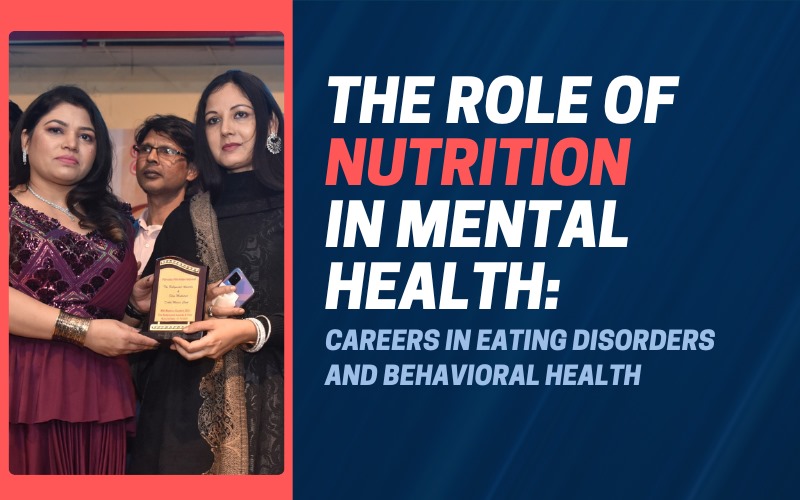Nutrition plays an important role in maintaining a healthy mental state. Eating healthy, nutrient-dense foods provides the building blocks for the brain to create essential neurotransmitters and hormones that regulate mood, energy, concentration, and memory.
Additionally, certain micronutrients can lead to deficiencies in these chemicals, leading to mood swings, fatigue, poor concentration, and more. With a nutrition certification course, individuals understand the specific nutrients they need and how to obtain them from their food. Through this knowledge, they can better maintain a balanced diet and mental health.

Nutrition is an essential part of physical and mental health. What we eat can significantly impact our energy levels, mood, and ability to focus. Eating a nutrient-dense diet can help boost our mood, reduce feelings of fatigue, and improve our overall well-being.
It’s important to understand the role of nutrition in mental health so we can make informed decisions about our diet and the foods we eat. Good nutrition can help to reduce symptoms of depression and anxiety, while poor nutrition may increase our risk for mental health problems. Making nutritional changes can be important to an overall mental health plan.
Role of Nutrition in Mental Health
Good nutrition is essential for overall health, including mental health. A healthy, balanced diet can help boost mood, fight depression, lessen anxiety, and improve cognitive abilities. A deficiency in certain vitamins and nutrients can lead to mental health issues, such as impaired brain function, fatigue, insomnia, and low mood. Eating a nutritious diet that includes lean proteins, complex carbohydrates, and healthy fats will supply your body with the key vitamins and minerals needed to maintain your mental health.
Best Bridal Makeup Tips For Destination Wedding
A healthy diet may include plenty of fruits, vegetables, whole grains, and healthy fats while avoiding processed and sugary foods. In addition to a healthy diet, other lifestyle changes may also benefit mental health. Regular physical activity can help reduce stress, improve mood, and increase energy levels. Practicing relaxation methods such as meditation and yoga can also help reduce stress and promote overall well-being.
Nutrition Course in Mental Health
A nutrition course in mental health addresses the impact of nutritional lifestyle habits and their respective influences on mental health, such as mood, behavior, cognitive functioning and performance. Topics may include mental health nutrition guidelines, the effects of specific diets on mood and behavior, the effects of eating disorders on mental health, and the role of diet in treating mental health disorders.
In addition, classes may delve into mental health nutrition counseling, diet for depression, and strategies for changing ineffective eating behaviors.
The Curriculum for Nutrition Course in Mental Health
- Introduction to Nutrition and Mental Health
- Anatomy and Physiology of Mental Health
- Nutrients and Brain Development
- Assessment of Nutritional Status
- Nutrients and Stress Management
- Nutrition and Mood
- Diet & Mental Health
- Nutrition and Neurocognitive Behavior
- Food and the Brain
- Nutrition Programs for Mental Health
- Nutrition in Special Populations
- Nutrition in Primary Care
- Nutrition Education for Mental Health
- Nutrition Interventions for Mental Health
- Evaluating Mental Health Programs
Careers in Eating Disorders and Behavioral Health
Eating Disorder Counselor/Therapist
Eating disorder counselors help individuals better understand their mental health conditions, explore treatments, and develop healthier lifestyles.
Behavioral Health Technician/Therapy Aide
Behavioral health technicians support counselors, therapists, and social workers. They help manage the day-to-day activities of individuals with behavioral health issues while providing client care and assistance with treatment plans.
Nutritionist
Nutritionists assist in developing and implementing individualized meal and nutrition plans for individuals with eating disorders and behavioral health conditions.
Social Worker
Social workers provide emotional counseling and support to individuals and groups affected by mental health issues and eating disorders.
Clinical Psychologist
Clinical psychologists provide psychotherapy, counseling, and assessment to individuals with mental health and eating disorder issues. They also provide support for family and friends affected by these challenges.
Psychiatrist
Psychiatrists are medical professionals who diagnose and treat mental health issues, including diagnosing and treating eating disorders.
Hairstylist Courses and Training | Become a Hairdresser
Psychologist
Psychologists support individuals with mental health issues and help them develop coping strategies.
Clinical Nutritionist
Clinical nutritionists help people with eating disorders develop balanced and healthy eating habits.
Therapist
Therapists counsel individuals with eating disorders and help them develop healthy behaviors.
Social Worker
Social workers provide support and resources to individuals with eating disorders and their families.
Health Educator
Health educators provide education about the dangers of eating disorders and promote healthy lifestyle choices.
Dietitian
Dietitians help people develop healthy meal plans and behaviors to achieve a healthy weight.
Researcher
Researchers study eating disorders’ causes, treatments, and effects.
Diploma in Dietetics and Nutrition Science in MeriBindiya International Academy
At MeriBindiya International Academy, our Diploma in Nutrition and Dietetics was organized to equip students with the competencies needed to start a career in nutrition and diet. This nutrition and food course comprises four modules created to educate individuals on all the core concepts of nutrition and dietetics.
Certificate Course In Cosmetology – A Complete Guide
Module One is a foundational exploration of nutrition, introducing students to the basics of nutrition science and the major food groups. They will gain a general overview of this complex field. The second module deepens students’ understanding by delving into nutritional assessment, which includes exploring how to calculate calories and other key nutritional facts.
Module Three shifts the emphasis to anatomy and physiology, encompassing all the major biological elements and the processes which bring them to life. Lastly, module four focuses strictly on dietetics, teaching students about nutrition throughout life and going into more intricate detail about meal planning.
How to Become an Eyelash Technician in 2022?
By enrolling in our comprehensive diet and nutrition course, you will gain an in-depth understanding of nutrition and dietetics, underpinning your success in this field. At the end of the course, you will be awarded our course completion nutrition certification, allowing you to demonstrate mastery of nutrition knowledge to prospective employers.
Final Thoughts
Nutrition plays an important role in mental health and can significantly impact people struggling with eating disorders and behavioral health issues. Which is why it is important to get enrolled in a certified nutrition course. With a range of career paths available within the nutrition and mental health field, the opportunity to help individuals suffering from these problems can be incredibly rewarding. Professionals in this field specialize in diet, nutrition, psychology and support groups to help individuals suffering from eating disorders and behavioral health issues. Through their expertise, these professionals can provide the resources and guidance for individuals to make the necessary changes in their lifestyle and attitude that will lead to better mental health.































